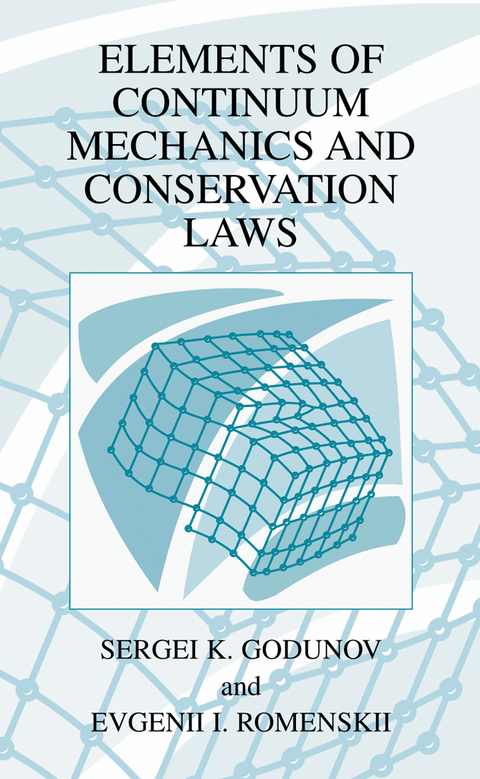
Elements of Continuum Mechanics and Conservation Laws
Seiten
2003
|
2003 ed.
Kluwer Academic/Plenum Publishers (Verlag)
978-0-306-47735-5 (ISBN)
Kluwer Academic/Plenum Publishers (Verlag)
978-0-306-47735-5 (ISBN)
Elements of Continuum Mechanics and Conservation Laws presents a systematization of different models in mathematical physics, a study of the structure of conservation laws, thermodynamical identities, and connection with criteria for well-posedness of the corresponding mathematical problems.
The theory presented in this book stems from research carried out by the authors concerning the formulations of differential equations describing explosive deformations of metals. In such processes, elasticity equations are used in some zones, whereas hydrodynamics equations are stated in other zones. Plastic deformations appear in transition zones, which leads to residual stresses. The suggested model contains some relaxation terms which simulate these plastic deformations. Certain laws of thermodynamics are used in order to describe and study differential equations simulating the physical processes. This leads to the special formulation of differential equations using generalized thermodynamical potentials.
The theory presented in this book stems from research carried out by the authors concerning the formulations of differential equations describing explosive deformations of metals. In such processes, elasticity equations are used in some zones, whereas hydrodynamics equations are stated in other zones. Plastic deformations appear in transition zones, which leads to residual stresses. The suggested model contains some relaxation terms which simulate these plastic deformations. Certain laws of thermodynamics are used in order to describe and study differential equations simulating the physical processes. This leads to the special formulation of differential equations using generalized thermodynamical potentials.
I. Elementary Properties of Deformations and Stresses.- II. Effective Elastic Deformation.- III. Differential Equations of Dynamical Processes.- IV. Well-Posedness of Differential Equations and Thermodynamics.- V. Multi-Dimensional Thermodynamically Compatible Conservation Laws.- Appendix. Structure of Thermodynamically Compatible Systems — S. K. Godunov.- § 1. Mathematical Aspects.- § 2. The Simplest Galilei-Invariant Thermodynamically Compatible Systems.- § 3. Methods of Constructing Equations.- § 4. Some Facts of the Theory of Representations of Orthogonal Transformations of Three-Dimensional Space.- § 5. The Clebsch—Gordan Coefficients.- § 6. Orthogonal Invariants.- Literature.
| Erscheint lt. Verlag | 31.5.2003 |
|---|---|
| Zusatzinfo | VIII, 258 p. |
| Verlagsort | New York |
| Sprache | englisch |
| Maße | 155 x 235 mm |
| Themenwelt | Mathematik / Informatik ► Informatik ► Theorie / Studium |
| Mathematik / Informatik ► Mathematik ► Analysis | |
| Mathematik / Informatik ► Mathematik ► Angewandte Mathematik | |
| Mathematik / Informatik ► Mathematik ► Arithmetik / Zahlentheorie | |
| Mathematik / Informatik ► Mathematik ► Wahrscheinlichkeit / Kombinatorik | |
| Naturwissenschaften ► Physik / Astronomie ► Mechanik | |
| ISBN-10 | 0-306-47735-1 / 0306477351 |
| ISBN-13 | 978-0-306-47735-5 / 9780306477355 |
| Zustand | Neuware |
| Haben Sie eine Frage zum Produkt? |
Mehr entdecken
aus dem Bereich
aus dem Bereich
was jeder über Informatik wissen sollte
Buch | Softcover (2024)
Springer Vieweg (Verlag)
37,99 €
Grundlagen – Anwendungen – Perspektiven
Buch | Softcover (2022)
Springer Vieweg (Verlag)
34,99 €
Eine Einführung in die Systemtheorie
Buch | Softcover (2022)
UTB (Verlag)
25,00 €


